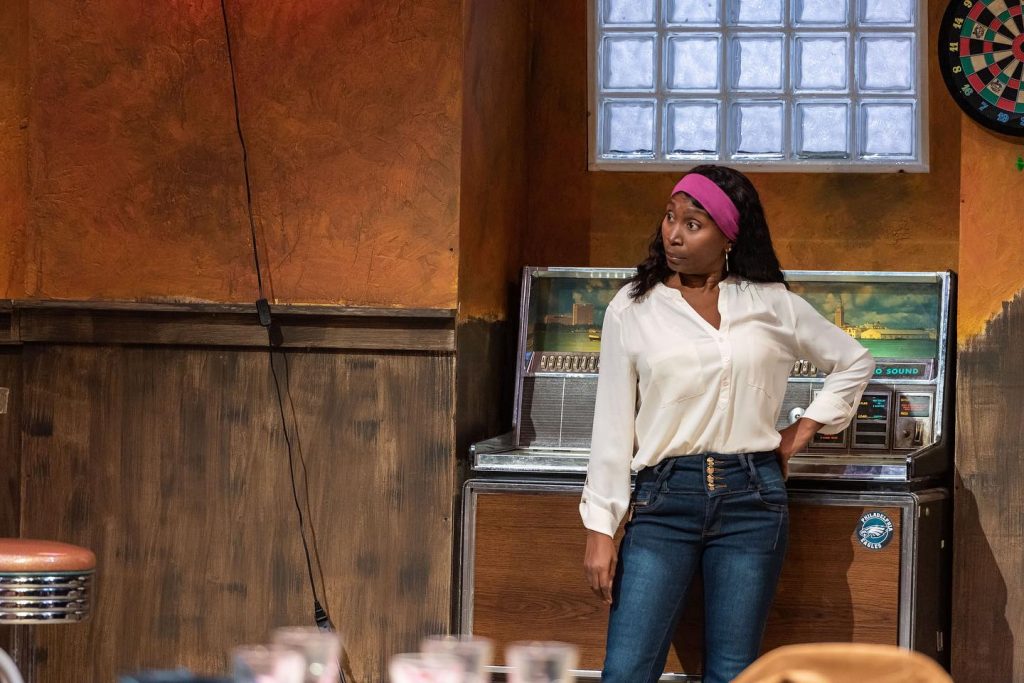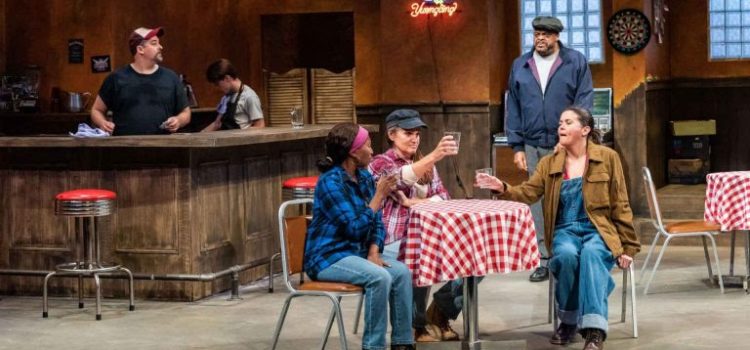By Lynn Venhaus
A domino chain of events have a devastating effect on a group of blue-collar steel workers in Lynn Nottage’s hard-hitting play, “Sweat,” which won the Pulitzer Prize for Drama in 2017 and retains its timeliness.
The Black Rep’s outstanding production, which kicked off its 45th season on Sept. 9 and continues through Sept. 26, features powerful performances in a lived-in atmosphere.
You know these characters, the ‘little guys’ who’ve worked the factory floor for years and thought their labor unions would protect them when the corporate owners moved operations to another country for a cheaper labor force.
Set in a local tavern where the Olstead mill workers hang out in Reading, Pennsylvania, this could have taken place in Granite City or Centralia, Ill., or near the shuttered car plants in St. Louis.
Director Ron Himes knows this and understands how today’s political and racial tensions are much the same as then, as well as immigration issues. Those are addressed in two story arcs — changing demographics and the territorial birthright felt by the longtime Caucasian residents.
Sadly, this tale is often not one of fiction in real lives — and has become familiar to anyone living anywhere in the Rust Belt, part of those Northeast and Midwestern regions where an industrial decline has been going on for decades, especially where coal and steel were economy mainstays.
The 2015 play starts and ends in 2008, but most of it takes place in flashback eight years earlier – in 2000, a pivotal time in America, after NAFTA is in place and corporations are going to Mexico. Transparency is not a word in these companies’ vocabulary, as they leave communities shattered and people broken.
The North American Free Trade Agreement was signed by Canada, Mexico, and the United States in 1994 and created a trilateral trade bloc.
The action veers from longtime friends celebrating birthdays, laughing, joking and talking about their lives to escalating tension as uncertainty about their jobs increases, along with harsh outlooks on their economic futures.
This ensemble is nimble and natural, conveying the complexities of their relationships with skill and emotional depth. The cast projects how longtime friends act and what their workplace is like with ease.
Nottage’s dialogue is shrewd and perceptive about race, class and identity. She understands the frustrations of these characters, and the lens in which they view the world.
Nottage, who is the only woman to win the Pulitzer Prize twice for Drama, first for “Ruined” in 2009, frequently writes about marginalized people.
For Cynthia and Tracey, is friendship or survival stronger? The actresses Amy Loui and Velma Austin expertly convey their conflicts and mood shifts, show how friendships sour when misunderstandings and envy erupt.
Their friend Jessie drinks too much and once had dreams of traveling the world but got a job at the factory and stayed. Kelly Howe gives what could be a stereotype some nuance – and superbly displays various levels of inebriation.
The cast is anchored by Stan, the bartender who was injured on the job at the mill and reflects on multiple labor issues as he is often the voice of reason – and at least history.
He attempts to put things in perspective and tells the young bucks who are chomping at the bit that they should be outraged by the bosses, not the little guys trying to get ahead like they are.
In his Black Rep debut, Black Anthony Edwards is impressive as the guy who’s good at listening, who speaks common sense, and has made lemonade out of the lemons he was given impairing his leg and being unable to work at what he did for years.
Physically, he looks like the character Stan. Praise to the costume designer Hali Liles for her spot-on outfits depicting the wardrobes of ordinary people living in the Rust Belt.
After they strike, and Cynthia and Tracey’s sons Chris and Jason are laid off, their lives are altered forever after tensions explode in violence. The fight choreography by Paul Steger is fluid and the cast well-rehearsed to make it seem natural.
Chris wanted to make something of himself, and Brian McKinley earnestly portrays his yearning to achieve, especially after watching his dad Brucie (frequent Black Rep performer A.C. Smith) fall on hard times after being shut out at a textile plant.
The boys serve prison sentences, as reflected in the opening scene with parole officer Evan, played with authority by Don McClendon. Franklin Killian is strong as the hothead redneck Jason, now tattoed on his face and a white supremist. He perfectly embodies the once fun-loving guy now a lost soul.
The subject of the boys’ rage is represented by Oscar, a Colombian American who works as the bar’s busboy but seizes an opportunity to make more money by replacing striking workers. The regular clientele are seething about this ‘scab.’
Oscar, well-played by Gregory Almanza, pours out his heart to Stan, telling him about how ignored he is, perceived to be an immigrant when he was born in the U.S. His dad swept floors at the mill, now he wants to achieve more. He is caught in the crossfire of misplaced fury.
The scenic design by Tim Jones aptly captures this world, with detailed property work by Meg Brinkley, all expertly lit by lighting designer John D. Alexander. The jukebox works well, thanks to the terrific sound design by Kareem Deanes.
Featuring one of the year’s best ensembles, a timely tale and expert production elements, “Sweat” is not to be missed.

“Sweat” will continue through Sept. 26, with Thursday show at 7 p.m., Friday and Saturday at 8 p.m., and Sunday at 3 p.m.
$15 student rush tickets are available for all shows — 30 minutes before the show with a valid student I.D.
For more information: www.theblackrep.org
Season subscriptions and single tickets for “Sweat” are available at www.theblackrep.org or by calling the Box Office at 314-534-3807. Groups of 12 or more may also reserve tickets by phone. Seating will be at 50 percent capacity; for complete information on current health protocols please visit www.theblackrep.org.
The Black Rep’s 45th Anniversary Season sponsors include the Arts and Education Council, The Black Seed Initiative, Centene Charitable Trust, Missouri Arts Council, Regional Arts Commission, Rodgers-Townsend, The Shubert Foundation, the Steward Family Foundation, and Washington University in St. Louis.
COVID-19 PROTOCOLS
Our top priority for reopening is the health and safety of our staff, artists and patrons. We have been working diligently to bring live theatre back. The Black Rep is part of the growing coalition of St Louis performing arts venues and producers that have agreed upon Covid-19 Vaccination/Testing and Mask Requirements for audiences, artists and staff through the end of 2021.
Everyone must be fully vaccinated or have received a negative covid test results no more than 72 hours prior to coming on campus. A Covid19 vaccination card or a negative test result must be presented upon entering the building.
Masks are required at all times while indoors on campus. Even if you are seated in pods and distanced, masks must remain in place.
Everyone will need to complete the visitorscreening.wustl.edu within 2 hours of your arrival to campus. You will receive a message indicating that you are cleared to come to campus and you will be asked to present the “cleared” message to ushers at the entrance of the building. For those without smart phones, there is a station in Mallinckrodt where you can complete the screener on an iPad. If you receive a message that you are “not cleared”, we ask that you not come to campus or leave campus if you are completing the screener on campus.

Lynn (Zipfel) Venhaus has had a continuous byline in St. Louis metro region publications since 1978. She writes features and news for Belleville News-Democrat and contributes to St. Louis magazine and other publications.
She is a Rotten Tomatoes-approved film critic, currently reviews films for Webster-Kirkwood Times and KTRS Radio, covers entertainment for PopLifeSTL.com and co-hosts podcast PopLifeSTL.com…Presents.
She is a member of Critics Choice Association, where she serves on the women’s and marketing committees; Alliance of Women Film Journalists; and on the board of the St. Louis Film Critics Association. She is a founding and board member of the St. Louis Theater Circle.
She is retired from teaching journalism/media as an adjunct college instructor.

